11 Things Coffee Enthusiasts Should Know About Nespresso
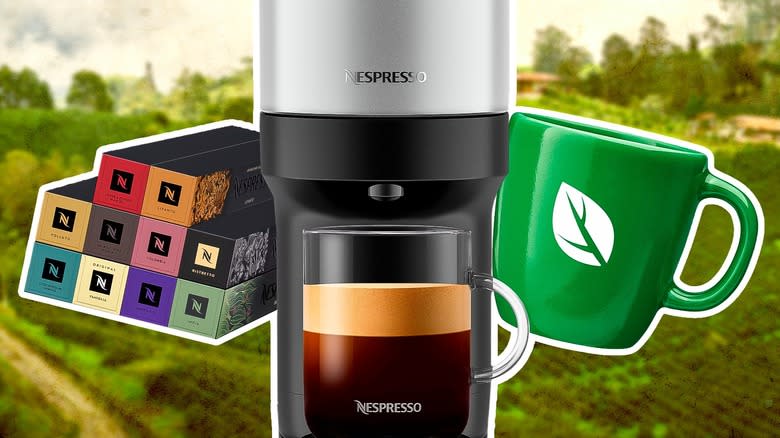
Any at-home coffee aficionado has likely heard of (and maybe even tried) the famed Nespresso coffee machine. This kitchen appliance provides the ability to brew a quality cup of coffee at the touch of a button in less time than your average home drip coffee device. Nespresso's coffee pods even have multiple uses -- yes: you can bake with Nespresso pods -- and are available at a range of prices for a variety of budgets. While Nespresso may seem like a no-brainer buy for coffee enthusiasts, there are a few things to know before splurging on a machine.
For example, the coffee made by Nespresso machines isn't genuine espresso, meaning you'll need to invest your hard-earned money elsewhere for that type of coffee. Additionally, it's worth educating yourself about the various capabilities of different types of Nespresso machines or the sustainability of Nespresso coffee brewing -- especially since its coffee is delivered via disposable pods. With that in mind, here are 11 things about Nespresso that coffee enthusiasts should know.
Read more: 11 Cleaning Tips For Keeping Your Oven Spotless
Nespresso Is More Sustainable Than Expected

Considering its coffee comes in disposable capsules, it's not unreasonable to assume Nespresso machines are a less environmentally friendly way to brew coffee. But the company is acutely aware of these sustainability concerns and has been committed to mitigating them for some time. Nespresso doesn't just talk the talk when it comes to sustainability efforts, though -- and it's actually less detrimental to the environment than many coffee enthusiasts likely imagine.
First, Nespresso pods are recyclable thanks to the free recycling bags the company offers. Customers can simply fill the bag with used capsules, send it back, and the company will recycle the aluminum pods for you. Beyond that, the company launched its first selection of compostable paper-based capsules to European markets in late 2023, which can simply be tossed into your home compost after use.
More than that -- and aside from any recycling or composting options -- a 2023 study from researchers at the University of Quebec discovered coffee capsules may actually have a lower carbon footprint when compared to three other coffee brewing methods (traditional filter, French press, and instant). This is primarily because pre-programmed machines and packaged capsules tend to reduce the amount of water and coffee used when brew your morning cup.
The Machines Don't Actually Make Authentic Espresso
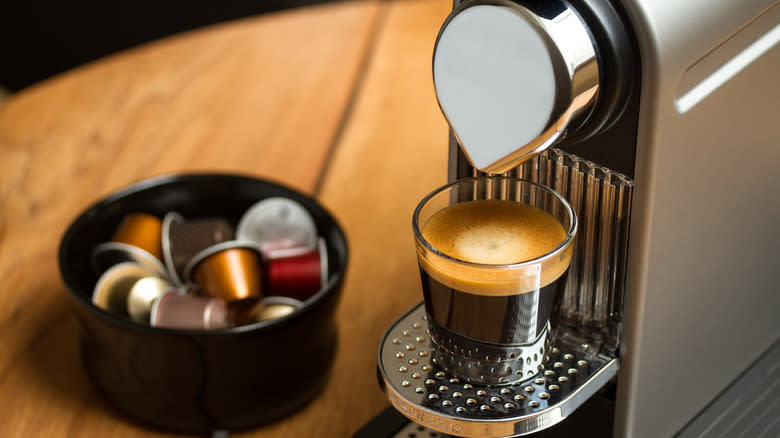
Espresso lovers: We regret to inform you that a Nespresso machine may not be your best choice if you're looking to brew authentic espresso. While the machines can produce espresso-sized amounts of coffee that are close to the real thing, even its Creatista machine -- which looks similar to a home espresso machine (and boasts a milk steaming wand) -- won't produce a true shot of espresso.
If you've ever worked as a barista, you know that there are some crucial variables at play for pulling the perfect shot of espresso, including the size of your grind, the time it takes for your shot to pull, and the ratio of coffee in versus coffee out. Given this, Nespresso's machines produce coffee that doesn't quite fall into the parameters of true espresso.
First, the fact that Nespresso uses prepackaged pods and brew settings makes it nearly impossible to dial in the coffee to your personal preferences -- an automatic downside to any home barista who's serious about brewing espresso. Customization issues aside, your Nespresso coffee is unlikely to ever match the robust intensity of an authentic espresso shot. Espresso brews at a much more concentrated level than Nespresso, after all, meaning your coffee will taste more like standard drip coffee than a shot of espresso.
Its Invention Was Inspired By An Italian Cafe
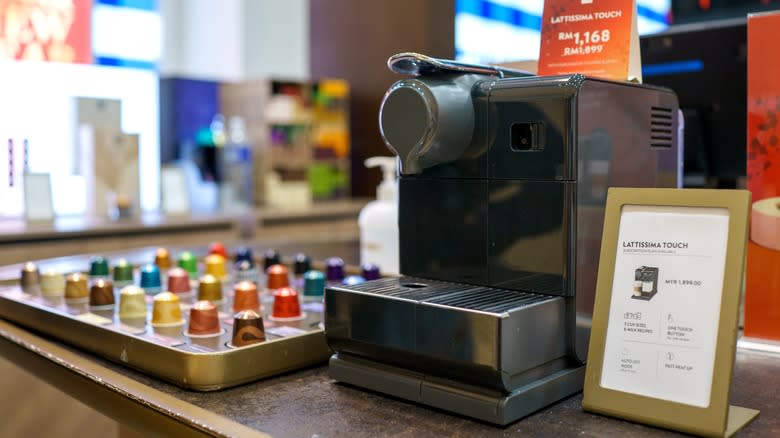
Believe it or not, the world of coffee capsules started all the way back in 1976 with Eric Favre. The mind behind the original Nespresso capsules experienced a "Eureka!" moment of sorts when visiting Café Sant'Eustachio in Rome. The famous cafe was known for producing superior espresso shots, which were heavily aerated as baristas pumped the pistons of the espresso machine. This newfound knowledge set off a spark for Favre, leading Nespresso to pioneer the world of coffee capsules -- and the rest is history.
The prevalence of single-cup coffee machines has exploded among U.S. consumers in the decades since Favre's invention, though it did take a minute for the appliances to become widely used. However, as of 2020, a whopping 40% of U.S. households reported having a single-cup coffee machine. Given the convenience of Nespresso machines and the seemingly ever-increasing quality of the coffee produced, it's relatively fair to expect this number will only continue to grow in the future.
Some Believe Nespresso Is An Upgrade Over Keurig
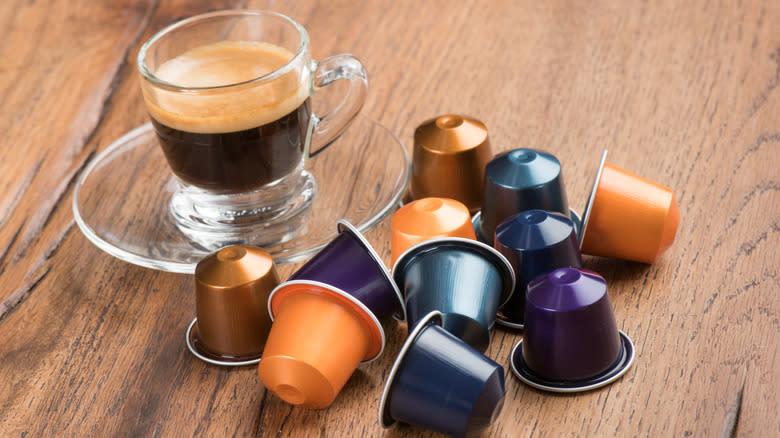
Having tasted coffee brewed by various models from both Nespresso and Keurig, we believe Nespresso produces a better-tasting cup far more consistently than its single-cup competitor. There are several potential reasons for this, including the fact that Nespresso produces stronger coffee than Keurig machines because of the different brewing process used by each appliance.
Keurig's brewing process is very similar to that of your standard drip coffee machine. Holes are punctured in the capsule before low-pressure water is pumped through, producing an adequate cup of drip coffee. On the other hand, Nespresso utilizes a high-pressure brewing system that contributes to the textural improvements and stronger flavor that Nespresso coffee boasts.
Nespresso's capsule offerings (especially its single origin pods) have always given us the stronger, more nuanced flavor profiles we look for when trying different coffees. Conversely, Keurig coffee seems more comparable to diner coffee: often lackluster taste-wise, texturally dull, and impossible to enjoy without adding some cream. We've also found Nespresso-brewed coffee tends to have a more appealing mouthfeel, with a bit of a creamier texture even when taken black.
The Machines Cater To Different Needs
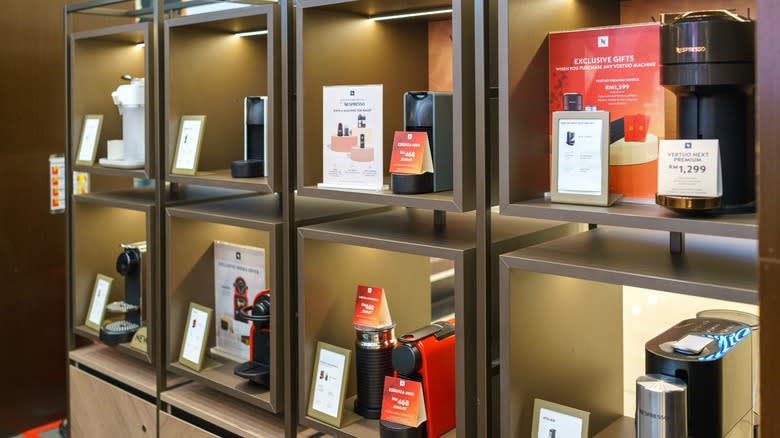
Given the longevity of the Nespresso brand, it makes sense that it's evolved to offer a variety of machines that suit different consumer desires around the world. Its popular Vertuo machine was released in North America in 2014 to appeal to a wider household audience, and differs from the original Nespresso in that it can also brew larger cups of coffee. Since then, Nespresso has only continued expanding its offerings to cater to various coffee preferences.
Some of its newer releases offer basic brew functions and Bluetooth capability, like its Vertuo Pop+. This compact machine offers five different brewing sizes and sits on the lower end of the Nespresso price spectrum as of July 2024. Its other Vertuo machines are solid choices, as well, but a big downside to the Nespresso Vertuo machines lies in the patented, barcoded capsules -- which forces you to exclusively brew with the company's capsules.
If you want to focus on making quality, espresso-sized beverages at home, you can opt for one of Nespresso's Original machines. For those who want something even more bougie, you can splurge on the Nespresso Vertuo Creatista machine. This lets you brew six different sizes of coffee and boasts a steam wand, preferable to the brand's milk frother if you're working on your latte art.
Nespresso Can Make Cold Brew
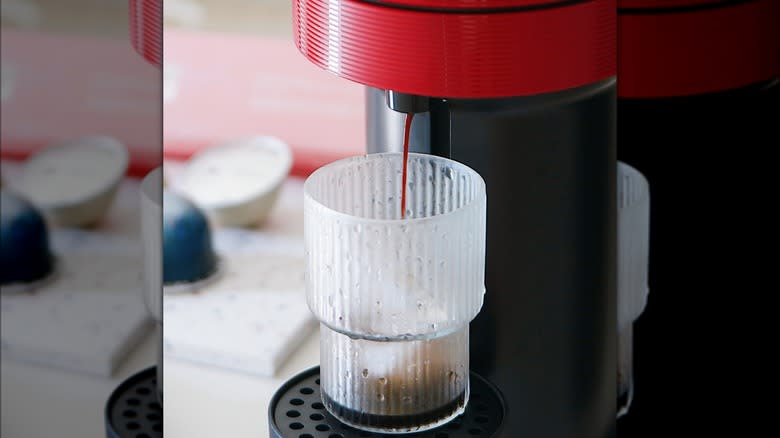
Maybe you're a fan of the coffee capsule concept, but wondering what to do in the warmer months -- when a hot cup of Joe sounds more hellish than heavenly. While the obvious solution is to make cold brew with your Nespresso machine by simply brewing your favorite capsule over ice, that will likely lead to a watered-down cup of lukewarm coffee. But Nespresso saw this gap in its offerings and sought to bridge it by creating cold brew capsules. Now, while these capsules are compatible with several Nespresso models, there are some things to know.
For starters, before using a Nespresso to make cold brew, be sure you're choosing the right pods for your preferred coffee. Nespresso offers both iced coffee pods (which are meant to be brewed normally over ice) and cold brew pods. Cold brew pods first bloom the coffee with hot water -- to extract optimal flavor -- before finishing the brewing process with cool water to temper any bitterness. One other thing to keep in mind when brewing cold brew coffee with Nespresso: fill your machine's tank with cool water rather than hot.
The Company Offers Single Origin Pods
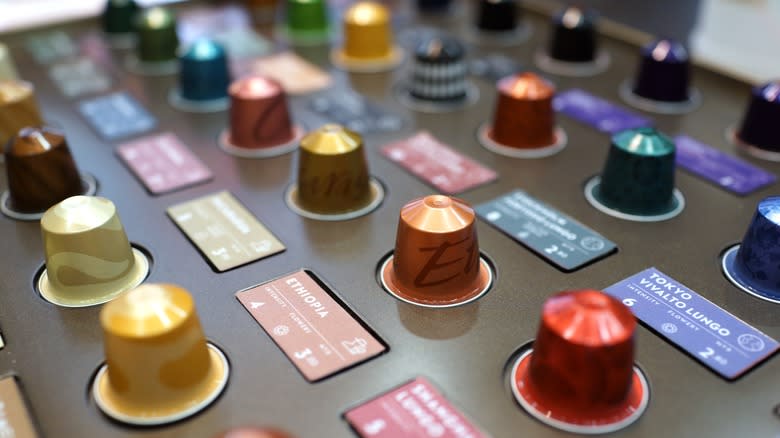
We've always been partial to single origin coffees -- or coffee that's produced in one particular region (and possibly even a single farm). Contrary to blends -- in which beans from various regions and farms are mixed together to achieve a certain flavor profile -- single origin coffees offer a unique intensity and singular flavor not found in blends. If you'd like to brew this type of coffee in your Nespresso, you can, as the company offers single origin capsules.
Nespresso's Pure Origin capsules are each sourced from a single country -- and quite frankly? We're impressed with the variety of regions and flavor profiles the company has chosen to feature in its single origin pods, which include India (spicy), Ethiopia (floral), Brazil (sweet), and Colombia (fruity). These offerings make the Nespresso a competitive choice among coffee aficionados who like sampling beans from around the world.
Blends may generally be a better choice since the beans are sourced from different regions. This makes it easier to balance the flavors if the quality of certain beans fluctuates throughout the year. However, if you like tasting the supposed personalities that coffee beans from different regions can offer, exploring single origin options may be your cup of tea -- and you can do so with Nespresso.
Some Coffee Pods Use Artificial Flavoring
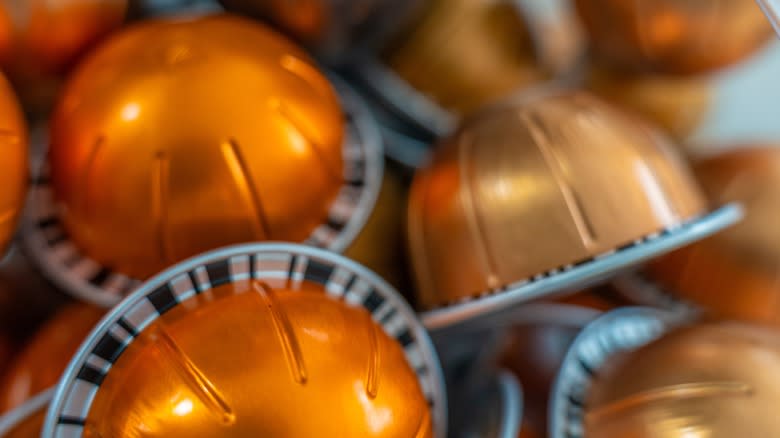
While most Nespresso pods only contain ground coffee, some have additional ingredients, as well. While this can beneficial (Nespresso has vitamin-infused pods, for example), depending on your personal preferences? You may want to avoid other Nespresso pods. In other words, if you're a coffee purist, you may want to steer clear of the pods with artificial flavoring.
More than that, when Tasting Table ranked 13 Nespresso coffee pods, we found the quality of Nespresso's flavored pods varied. For example, its Nocciola (Italian for hazelnut) pod offers a well-balanced nuttiness without being too overwhelming or artificial tasting. The vanilla flavor of the Vaniglia pods, meanwhile, felt a little lackluster and didn't hold up once milk was added to the brew.
If you tend to prefer flavored coffee, you could certainly opt for one of Nespresso's flavored pods, but particular consumers may prefer to flavor their coffee on their own via homemade syrups or other natural flavors. Personally, we often find that flavoring makes coffee taste too sweet for our liking (but to each their own).
Nespresso Machines Have A Long Warranty And Lifespan
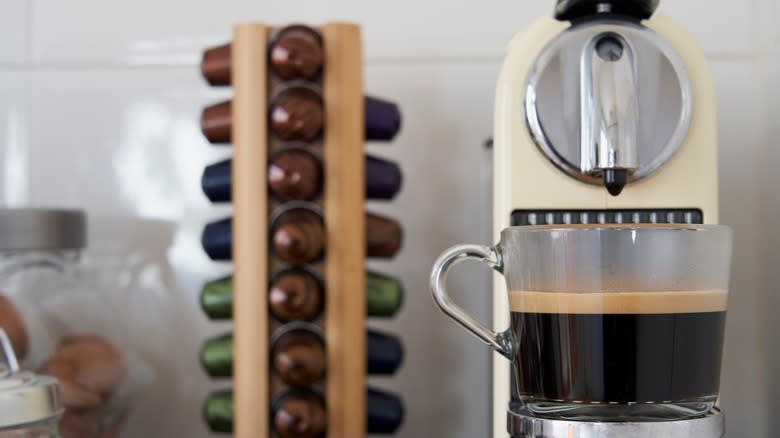
If you're looking to get the most bang for your buck out of a Nespresso machine, you probably want to know about its longevity. For starters, a lengthy two-year warranty has customers covered should any problems arise during the machine's first couple years. But with proper use, your machine can last far longer -- and there's a good chance it will still be on your countertop for several years after purchase. Moreover, if you want to stock up on pods, they also have a long lifespan, with a shelf life up to 12 months.
Now, the lifespan of your machine obviously depends on how well you care for it. Your Nespresso will need to be cleaned regularly (perhaps even daily) in order to keep it in tip-top shape, after all. Many machines come with an auto-clean function, while others require a few additional steps. Fortunately, Nespresso's website details how to clean each machine, as well as signs that your machine needs to be cleaned or descaled.
Descaling should happen less often (about every six months or so), and many Nespresso machines have an indicator light to let you know your machine needs to be descaled. No matter what you do, Nespresso warns to never descale its machines with vinegar.
Its AAA Sustainable Quality Program Encourages Sustainable Practices
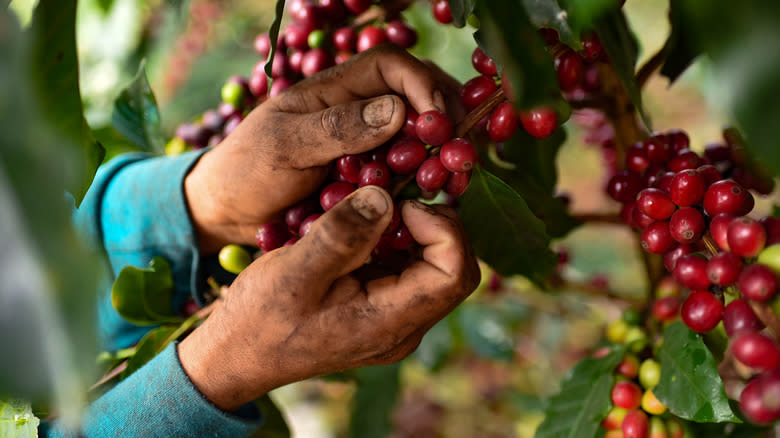
In 2003, Nespresso paired up with the Rainforest Alliance to create its AAA Sustainable Quality™ Program, with the goal of improving the sustainability of its coffee without diminishing the quality or flavor. Now, while environmental concerns play a large role in these efforts, Nespresso's AAA program also takes a holistic approach in that the company is heavily invested in improving the socio-economic stability of the farmers it sources from.
In fact, over 90% of Nespresso's coffee is sourced from its AAA program as of July 2024. While the AAA program is still going strong, new environmental factors and climate change concerns have prompted Nespresso to take another step in its journey by focusing on regenerative agriculture, as well. To put it simply, regenerative agriculture is a collaborative attempt to counteract climate change and increase the long-term viability of coffee farming practices as well as the livelihood of coffee farmers.
Since regenerative agriculture can be a complicated process -- with each region requiring different regenerative practices -- Nespresso and the Rainforest Alliance created a Regenerative Coffee Scorecard. This allows farmers to easily identify specific steps they can take to incorporate regenerative agriculture practices on their properties.
Nespresso Is B Corp Certified

A B Corp certification is one of the most notable designations a company can receive. In order to receive this certification, a company must meet a number of environmentally and socially focused criteria, and any company that obtains the certification is reevaluated every three years to ensure it still adheres to the required standards. Nespresso is one of those companies, and it has a B Corp rating of 84 as of July 2024.
Of course, Nespresso is always trying to increase that score. The company has joined B Corp's mission by implementing several systems that hold it accountable as it fosters positive environmental and societal change. Perhaps the most prominent way Nespresso has demonstrated its commitment to the B Corp mission is by creating the aforementioned AAA Sustainable Quality Program.
Beyond its AAA program (and the regenerative agriculture practices it's implementing), Nespresso also has a Sustainability Advisory Board. It's partnered with other companies to plant over five million trees, and it's currently working toward the lofty goal of making all cups of coffee carbon neutral by 2050.
Read the original article on Tasting Table.

 Yahoo Lifestyle
Yahoo Lifestyle 
